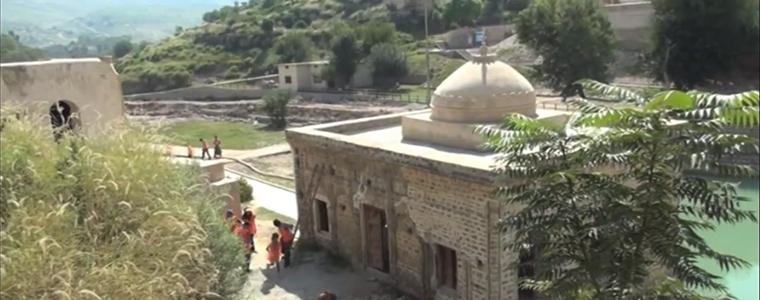A nonprofit foundation organized a group of mostly Muslim students to clean up a Hindu temple outside of Lahore, Pakistan, in a project supported by USIP’s Peace Innovations Fund for Pakistan. A video and an accompanying blog post by USIP Country Representative Nadia Naviwala explain what happened.

Between Islamabad and Lahore, Pakistan, the famed Katasraj Mandir (Hindu temple) in Katas village is imbued with folklore from the Hindu epic Mahabharata. The pond at the temple is believed to have been created by the Hindu lord Shiva’s tears, and it was always said to be bottomless.
But today, the pond is drying up due to industrial activity in the area. The temple is deteriorating and the Hindu community – except for one family – has disappeared. According to local caretakers, local youth often desecrated the temple, especially in retaliation for international events that angered them.
The revelation made Zar Aslam, head of The Environmental Protection Foundation (TEPF), nervous. She was in Katas to persuade the same students who were used to taking their anger out on the temple to clean it up as an expression of respect and tolerance. Zar had started the nonprofit TEPF to encourage students to commit to community service, by organizing events for them to pick up litter, plant trees and install trash bins where there are none.
This was the first time she was trying to cross a barrier of religious intolerance. Late last year, The Associated Press reported that on the “Day of Love for the Prophet,” declared at the height of protests against the anti-Islam film “Innocence of Muslims,” a Hindu temple in Karachi was ransacked. Within weeks, another Hindu temple in Karachi was razed.
Pakistani government officials have considered nominating Katasraj Mandir as a World Heritage site and twice allocated funding to renovate the temple. India’s deputy prime minister visited Katasraj in 2005. Earlier this year, Pakistan’s president expressed concern about the deteriorating state of the temple, stressing the need to preserve ancient sites of historical and religious significance because they are part of “our civilization,” irrespective of which faith they represent.
After a few months of cajoling, Zar finally convinced the local government school to cooperate with her project. She spoke to the students about how they would feel if a mosque was disrespected.
The youths agreed that they, as Muslims, should feel equally bad if a Hindu temple was abused. The headmaster also joined in, telling the students about the traditions and beliefs of Pakistan Hindu pilgrims who visited Katasraj. The pilgrims believed that bathing in the pond would wash away their sins.
Early on the morning of October 6, 2012, TEPF ferried four busloads of 100 students from Lahore to Katasraj. They joined 30 counterparts from the local government school. Together, the youths collected almost 100 bags of litter, planted 30 six-foot-tall trees, installed four trash bins, and put up two signs asking visitors to the site not to litter.
A small award under USIP’s Peace Innovations Fund for Pakistan covered the material costs of the volunteer effort – bus tickets, trash bags, gloves, masks, trash bins, trees, and signboards.
More than 98 percent of the youths involved in the project were Muslim – reflecting the demographics of Pakistan – and had never before visited another religion’s place of worship.
In their evaluations of the project, the young people were unanimous in their favorable sentiments about the experience. Here’s a sample of their comments:
“This project changed my way of thinking about other religions and religious places…. I will tell my friends to keep these places clean, whether it is of Hindus, Sikhs, Christians or others, because we are part of one world.”
-Mehrab, age 12
“First, I thought that these religions had very strange legends and did not have any logic. But as I saw the temple and how sacred it was, I felt very sad that the temple was being littered…. I learnt that throwing litter is easy but picking it up is very difficult. If you have litter to throw, throw it in the dustbin.”
-Umer, age 11
“Performing an unusual act like never before -- cleaning a temple -- helped me to develop sentiments and emotions for other religions as well as eradicating the previous notions I carried related to racism. It doesn’t matter whoever owns a place, it’s our earth, our space and our country.”
- Rukhshan, age 13
To see how the Foundation’s project evolved, read the author’s May 2012 blog post. What do you think -- can cleaning up public spaces help promote communal harmony? Give us your ideas in the “Comments” below.
Nadia Naviwala serves as country representative for the U.S. Institute of Peace in Pakistan.
Comments:
| Date: Wednesday, January 30, 2012 6:09 AM From: |
|
Sincere good wishes for the project and admiration for Zar Aslam. |



